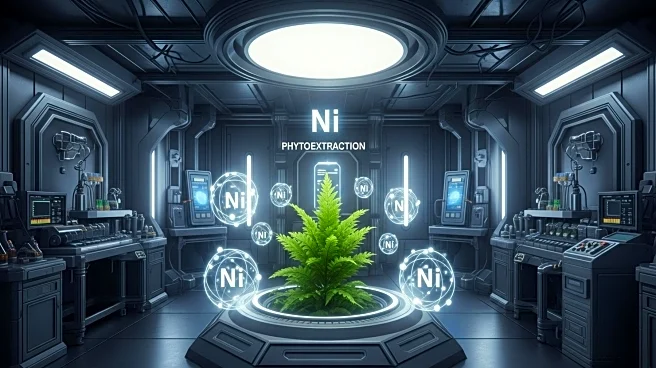What's Happening?
Genomines, a France-based company, has raised $45 million in a Series A funding round to further develop its innovative phytoextraction process. This method uses genetically enhanced plants, known as hyperaccumulators, to extract heavy metals like nickel from the soil. The process involves plants such as alyssum, sunflower, and ferns absorbing metals through their roots, which are then transferred to the leaves. Once mature, these plants are harvested, dried, and burned, with the resulting ash refined to recover the metals. Genomines aims to offer a more environmentally friendly and cost-effective alternative to traditional mining, which typically requires significant capital investment. The company is exploring partnerships with automakers and battery manufacturers to validate the concept and establish market applications.
Why It's Important?
The development of phytoextraction technology by Genomines represents a significant shift in the mining industry, potentially reducing environmental impact and operational costs. Traditional mining is capital-intensive and environmentally damaging, whereas Genomines' approach could lower costs by up to 40% compared to conventional methods. This innovation could lead to the creation of a new industry focused on plant-based metal extraction, offering a scalable resource base that could rebalance global mineral supply chains. The environmental benefits, coupled with cost competitiveness, make this technology attractive to industries reliant on metals, such as automotive and battery manufacturing, which are increasingly seeking sustainable solutions.
What's Next?
Genomines plans to use the new funding to conduct further field tests and establish offtake agreements with partners. The company is working on proof-of-concept projects with major automakers like Hyundai Motor Group and Jaguar Land Rover, as well as battery manufacturers. These collaborations aim to demonstrate the viability and scalability of phytoextraction technology. Additionally, Genomines is set to launch pilot projects in South Africa, which will further test the process in different environmental conditions and expand its market reach.
Beyond the Headlines
The adoption of phytoextraction could have broader implications for environmental remediation and sustainable agriculture. By utilizing plants to clean contaminated soils, this technology could be applied to areas affected by industrial pollution, offering a natural solution to soil decontamination. Furthermore, the success of Genomines' approach could inspire similar innovations in other sectors, promoting the use of biotechnology to address environmental challenges and reduce reliance on traditional, resource-intensive methods.








